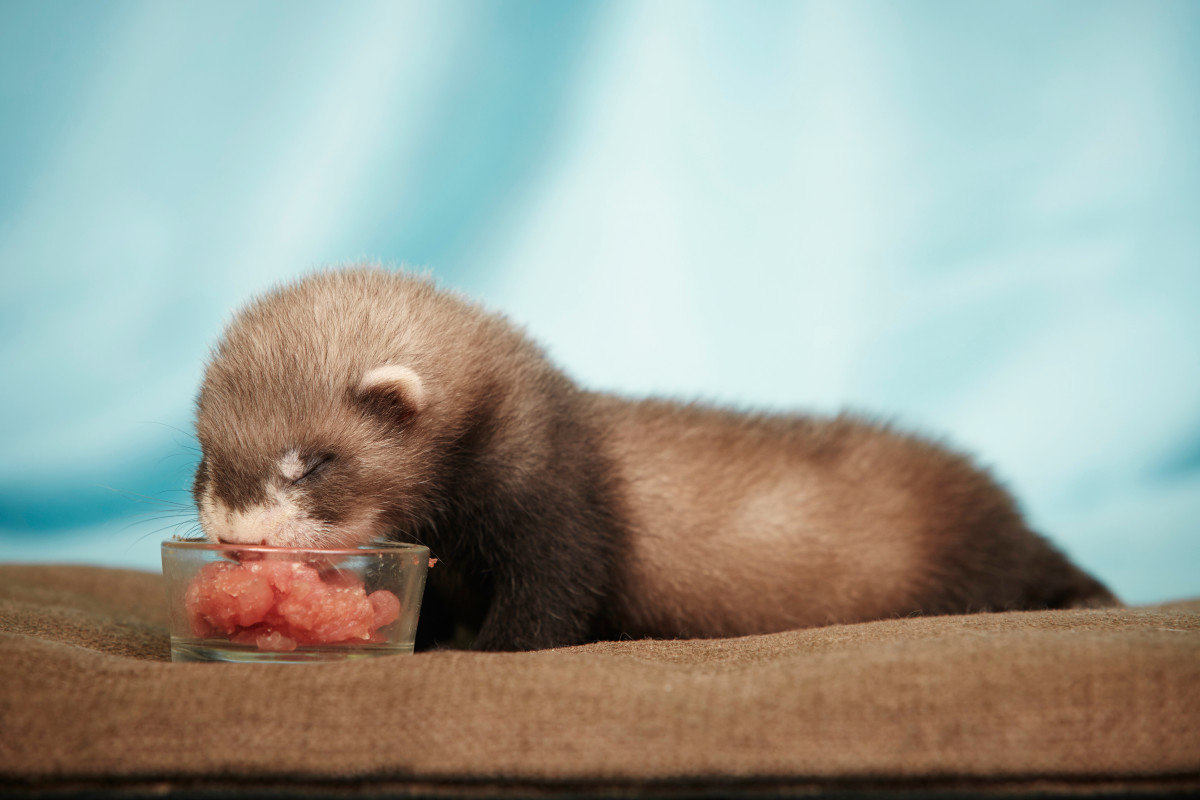preahvihearhotel.com – Ferrets are energetic, carnivorous animals with specific dietary needs that differ from many other small pets. Feeding your ferret the right diet is essential to ensure they stay healthy, active, and strong. In this article, we will explore everything you need to know about feeding ferrets, from their nutritional requirements to the best types of food and common feeding mistakes to avoid.
1. Understanding Ferret Nutrition
Ferrets are obligate carnivores, meaning their diet must consist mostly of animal protein and fat. They have a fast metabolism and a short digestive tract, so they need nutrient-dense food to meet their energy needs. Key components of a healthy ferret diet include:
- High protein: Ferrets require a diet rich in animal-based protein (at least 30-40%).
- High fat: Fat provides essential energy for ferrets (about 15-20%).
- Low carbohydrates: Ferrets are not designed to digest carbohydrates or plant matter well, so their diet should have minimal carbohydrates.
- Taurine: This amino acid, found in animal tissues, is essential for a ferret’s heart and eye health.
2. Commercial Ferret Food: Choosing the Right Pellets
Commercial ferret food is specially formulated to meet the high protein and fat requirements of ferrets. When choosing ferret pellets, look for the following characteristics:
- High protein content (30-40%)
- High fat content (15-20%)
- Low fiber: Less than 3% fiber is ideal since ferrets have difficulty digesting plant matter.
- Animal-based ingredients: Meat should be the primary ingredient, not plant proteins or grains.
Some high-quality commercial ferret food brands are designed to provide complete nutrition for your ferret. Ensure the food you choose is free from fillers like corn, soy, or grain, as these ingredients do not provide the nutrients ferrets need.
3. Raw Meat Diet for Ferrets
Many ferret owners prefer to feed their pets a raw meat diet, which more closely mimics the diet ferrets would have in the wild. A raw diet can be a healthy option, but it requires careful planning to ensure your ferret receives all the necessary nutrients. A proper raw diet should consist of:
- Whole prey items: Such as mice, chicks, or quail
- Raw muscle meat: Chicken, turkey, rabbit, and beef
- Organ meats: Liver, heart, and kidney for essential vitamins and minerals
- Bones: Raw bones help with dental health and provide calcium
It’s important to maintain a balanced ratio of meat, organs, and bones to ensure your ferret gets the right nutrition. Consult with a veterinarian or a ferret nutrition expert if you choose to feed your ferret a raw diet.
4. Feeding Schedule and Portion Sizes
Ferrets have high metabolisms and need to eat frequently. Instead of set meal times, it’s best to provide food throughout the day:
- Free-feeding: Leave dry pellets available at all times so your ferret can eat as needed.
- Raw diet portions: If you are feeding a raw diet, offer meals 2-3 times per day, depending on your ferret’s activity level and size.
Monitor your ferret’s weight to ensure they are not overeating or underfeeding. Overfeeding can lead to obesity, while underfeeding can cause malnutrition.
5. Treats for Ferrets: What’s Safe and What to Avoid
Ferrets can enjoy occasional treats, but it’s important to choose healthy options that align with their carnivorous diet. Safe treat options include:
- Freeze-dried meats: Chicken, turkey, or beef
- Cooked eggs: Boiled or scrambled without seasoning
- Small pieces of raw meat: Occasionally, as a treat in addition to their regular diet
Avoid giving your ferret treats that are high in sugar, carbs, or artificial ingredients. Foods that should never be fed to ferrets include:
- Fruits and vegetables: These can cause digestive problems and are not part of a ferret’s natural diet.
- Grains or bread: Ferrets cannot process carbohydrates efficiently.
- Dairy products: Ferrets are lactose intolerant.
- Chocolate or sugary treats: These are toxic to ferrets and can lead to serious health issues.
6. Hydration: Fresh Water is Essential
Ferrets need constant access to fresh water to stay hydrated. Use a water bottle with a sipper tube or a heavy bowl that won’t easily tip over. Check and refill the water daily, and clean the bottle or bowl regularly to prevent bacterial growth.
Avoid giving your ferret sugary drinks, milk, or any liquids other than water. Dehydration can lead to serious health issues, so it’s crucial to ensure your ferret has a reliable water source at all times.
7. Common Feeding Mistakes to Avoid
Feeding ferrets the wrong food or making mistakes in their diet can lead to health problems. Here are some common feeding mistakes to watch out for:
- Feeding cat or dog food: These foods are not formulated to meet the specific nutritional needs of ferrets and can lead to deficiencies.
- Giving too many treats: Even healthy treats should be given sparingly, as too many can lead to imbalances in their diet.
- Feeding too much plant-based food: Ferrets have a limited ability to digest plant material, so keep their diet strictly animal-based.
- Inconsistent feeding schedule: Ferrets need regular access to food to maintain their energy levels, so free-feeding or multiple meals per day is important.
8. Conclusion
Feeding your ferret a well-balanced, meat-based diet is key to keeping them healthy, energetic, and happy. Whether you choose commercial ferret food or a raw meat diet, ensure it provides the high levels of protein and fat that ferrets require. Avoid sugary, plant-based, or processed foods that can harm their health, and always provide fresh water. With proper nutrition, your ferret will thrive and enjoy a long, healthy life.
